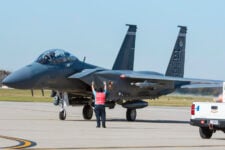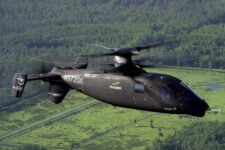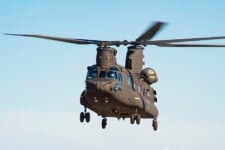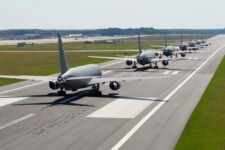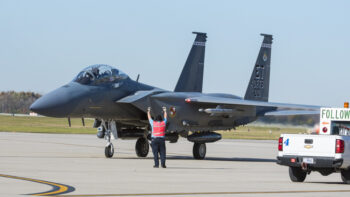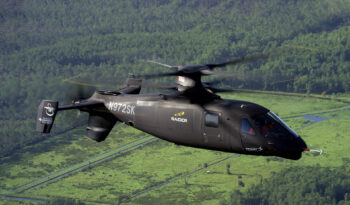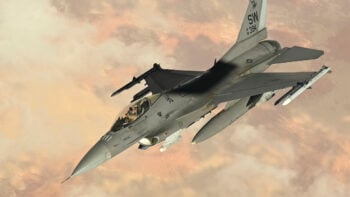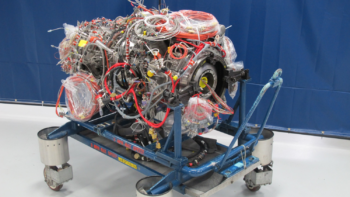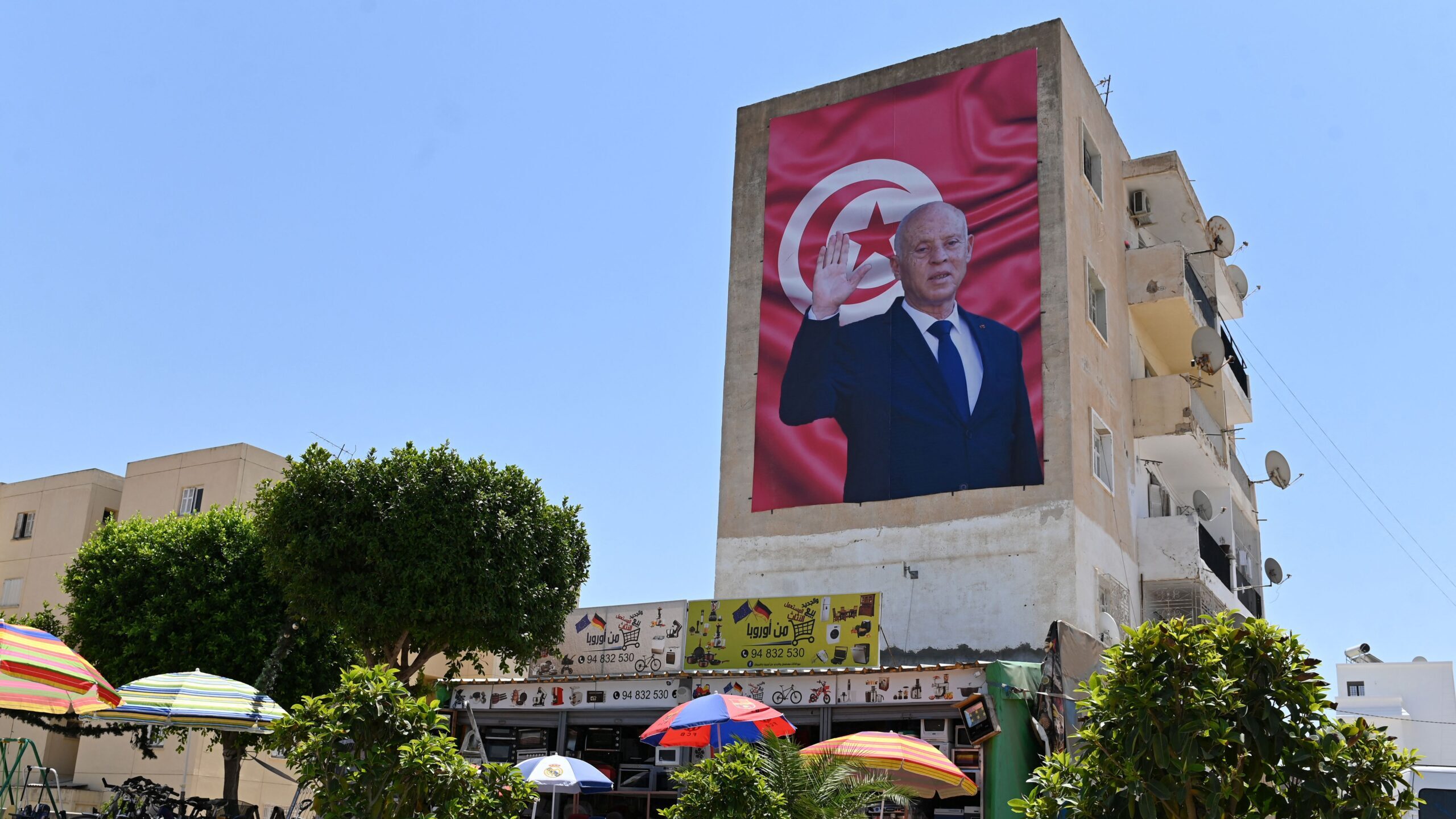
A billboard depicting Tunisia’s Kais Saied hangs on the side of a building in the east-central city of Kairouan, on July 26, 2022. (Photo by KABIL BOUSENA/AFP via Getty Images)
BEIRUT – A constitutional referendum in Tunisia that brought new, expansive powers to President Kais Saied has called into question Western defense deals, analysts say, as the US and others balance the need for friendly relations with the North African nation and its steady, troubling slide away from democracy.
“The US provides Tunisia with about $190 million per year, roughly evenly split between security assistance and programs to promote the country’s economy and democratic institutions,” Michaël Tanchum, a senior fellow at the Austrian Institute for European and Security Policy (AIES) and a non-resident fellow at the Middle East Institute (MEI) in Washington, DC, told Breaking Defense. “Tunisia’s strategic position in North Africa and the Mediterranean makes the country an important partner for the US.
“While Washington is uncomfortable with the country’s democratic backsliding, it would be imprudent to sacrifice its security relationship with Tunis, creating an opening for rival powers to fill the void,” he said.
In April the Biden administration made it clear how concerned it was with Tunisia’s “democratic backsliding,” revealing an annual budget that cut aid to the nation by nearly 50 percent. When it comes to defense deals, one particular potential bellwether, Tanchum said, is the proposed sale of American T-6C Texan trainer aircraft to the Tunisian air force.
On July 4, weeks before the referendum passed on July 25, the US Air Force Life Cycle Management Center awarded Textron Aviation a $90.7 million contract modification for the delivery of eight T-6C aircraft to Tunisia’s air force, a modification to the approval of the State Department to supply Tunisia with twelve T-6C Texan trainers at an estimated cost of $234 million in 2019.
The aircraft delivery is scheduled to start by March 2023, be completed by September 2026 and will be financed in its majority as a part of US military aid to Tunisia, while the remaining amount will be paid by the Tunisian government, according to the Tunisian Ministry of Defense statement also on July 4.
Tanchum said whether the delivery of the T6-Cs happens, among other potential deals, “will be an indication of how Washington understands its strategic priorities.”
Ryan Bohl, a Stratfor Middle East and North Africa Analyst at Rane, a private intelligence forecasting firm, was skeptical that the military aid will continue apace in the wake of the referendum.
“I think with the uncertainty of whether or not the United States will follow through on cutting military to Tunisia by half that the T-6C deal is now in doubt,” he said, adding that the US and Europe both saw the referendum as “a trend towards authoritarianism.”
“After it we could see cuts in military aid to the Saed regime, putting both this deal and others in question,” he told Breaking Defense.
T-6C is not the only western aircraft that Tunisia eyes to expand its air force. The State Department in 2020 approved the sale of four AT-6 Wolverine Light Attack aircraft. In 2021, many reports claimed that Tunisia wants to procure F-16 fighters through the military aid to replace its aging Northrop F-5E aircraft, but no official announcement was made regarding this matter. Also, in March 2022, Tunisia sealed a contract to acquire four Cessna Grand Caravan EX utility aircraft to boost intelligence, surveillance and reconnaissance (ISR) capabilities.
In the months after the budget roll-out, the US has struck a critical tone, but has not signaled it will abandon Tunis.
“Since July 25, 2021, the suspension of constitutional governance, consolidation of executive power, and weakening of independent institutions have raised deep questions about Tunisia’s democratic path, both in Tunisia and internationally,” the US Embassy there said following the referendum. “In coordination with our allies and partners, the United States has and will continue to use all tools at our disposal to support the Tunisian people in forging a democratic and accountable government that preserves the space for free debate and dissent, safeguards the human rights and fundamental freedoms of all, promotes long-term prosperity, respects judicial independence and the rule of law, and establishes the checks and balances critical to the health of all democracies.”
A State Department official declined to comment to Breaking Defense directly about the T6 deal or any others for this report, but echoed concerns about Tunisia’s “alarming erosion of democratic norms over the past year.”
“The U.S.-Tunisia partnership is strongest when there is a shared commitment to democracy and human rights,” the official said. The White House declined to comment further.
Limited Financial Resources
The imperilment of military aid comes as Tunisia’s air force faces many challenges in its expansion process, the top of which is the country’s financial limitations for its military.
“Tunisia’s primary obstacle to expanding its air force capabilities is financial,” Bohl said. “It does not get large-scale military aid from allies like France or the United States that would allow it to expand its air force much beyond what it currently has. And its own budget, which in 2020 was just over a billion dollars, is constrained from acquiring new equipment without that kind of military aid.”
He added that so long as Europe and the United States are willing to provide military aid and training to Tunisia’s air force, it can continue to benefit from these ties.
“But there’s now political pressure in Washington to reduce ties because of the centralization of power on the presidency and the reversal of democratic gains from the Arab Spring. If American ties are reduced, so are French ones and Tunisia will be left with fewer options to modernize its Air Force,” he stressed.
Tunisia is a relatively small sized country in North Africa bordered by Algeria and Libya. With armed conflicts in Libya, many claims of corruption back home and close defense ties between Algeria and Russia, Bohl said Tunis is most likely focused less on its international reputation than it is on its own security and controlling its borders.
“At the moment Tunisia’s air force is largely focused on self-defense and controlling the border where drug smugglers, human traffickers, and terrorists attempt to cross from Libya into Europe,” he said. “Its posture is overall defensive in large part because Tunisia does not have border disputes with its neighbors and is not currently conducting an activist foreign policy abroad.”
He added that if the defense deals discussed above are completed, they would enhance Tunisia’s ability to control its skies and conduct patrol missions to monitor migrant flows and possible terrorist infiltration.
“But given their limited nature they won’t necessarily result in a strategic change in the air force’s overall capabilities,” he concluded.
In response to questions about the recent referendum, Textron Aviation, which makes the T-6C and the AT-6 Wolverine, told Breaking Defense that Tunisia “has been an ally of the United States and a strategic partner in North Africa” and that the company is “aligned with the US State Department and adhere[s] to their guidance on all foreign military sales.”
Prior to the referendum, Textron said it had considered the T-6 deal as an opener for other potential international deals, including interest in the Wolverine.
“We have seen an uptick in global interest in the Beechcraft T-6C Texan II and Beechcraft AT-6 Wolverine. In particular, our sales team is actively engaging with prospective customers across nearly every continent,” the spokesperson said. “In fact, the global fleet of 999 Beechcraft T-6 Texan II aircraft has already surpassed 4.8 [million] flight hours across 12 nations and two NATO flight schools.”
He added that the interest in the Wolverine comes in the wake of multiple nations having recently conducted some successful AT-6 operations with the U.S. Air Force at Moody AFB.
Boeing buys GKN factory, ending dispute over F-15, F/A-18 parts
Through the deal, Boeing’s litigation with supplier GKN Aerospace will be dropped, and the aerospace giant will take possession of a St. Louis-area factory it used to own.
